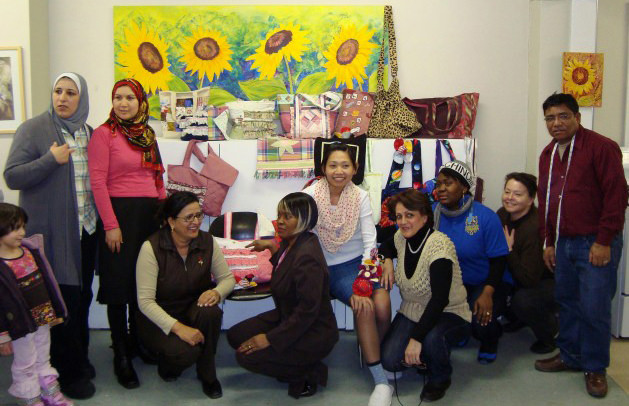For ten years, EcoEquitable has been guided by one simple goal: sustainability. Its mission is to achieve that goal for both its clients and the environment in which we live and work. A volunteer- driven community economic development initiative, it specializes in the training of unemployed and underemployed new immigrant women to become professional seamstresses.
It also serves as a highly effective recycling program for such organizations as the National Capital Commission and Parks Canada, which donate used banners that EcoEquitable transforms into eye- catching fashion bags, purses and yoga mat bags. Quickly becoming hot items around town, the unique and colourful designs are each one-of-a-kind and are hand-sewn with care and hope for a better life.
In 2011, a grant from the Ottawa Community Foundation supported EcoEquitable’s “Sowing for Jobs” program that provided sewing training to 20 new immigrant women, helping them to build employment skills and begin integrating into the workforce. A six-month project that gave participants practical, hands-on experience, “Sowing for Jobs” included paid work contracts that helped motivate, test and refine their skills as they learned to operate domestic and industrial sewing machines.
“The program is really about capitalizing on women’s natural strengths to create a new brand of entrepreneur in our city,” says Tara Templin, Executive Director of EcoEquitable. “Even with the responsibility of caring for children at home, seamstresses can earn $20-40,000 per year, allowing them to attain autonomy, self-confidence and a sustainable livelihood.”
Following the initial training sessions, participants were provided with financial literacy training, networking activities and job placement services in the sewing sector, and future opportunities to teach their new skills to children in Ottawa schools. Participants also learn sustainable business practices, as all materials used for the sewing contracts are recycled fabrics and textiles. Upon completion of the training program, participants receive professional sewing certification.
“We were astonished at the changes we witnessed among our participants in the first year of the program,” said Tara. “Not only have many of them found work opportunities that suit them for the very first time, but they rapidly built cross cultural communication skills as they collaborated with their colleagues from all corners of the world.”
“We never could have foreseen the incredible impact that would be achieved through the support network the trainees naturally develop among themselves. During and following the program, the women remained in close contact, visiting each other’s homes and even planning business opportunities together,” said Tara. “Thanks to the grant we received from the Community Foundation, we were able to accomplish so much more with the program than we had ever anticipated.”
Since completing the program, many graduates have expressed an increase in self-confidence and entrepreneurial skills. One of the participants began a weekly quilting group for her fellow graduates and now sells the quilts through EcoEquitable. Another developed her own line of Eco-bags, which she now sells to the public.
Due to the success of the program, EcoEquitable has since developed and begun to offer a beginner level “Sowing for Jobs” program with seed funding from the Ottawa Community Foundation that will continue through 2013, along with other program funding, with the support of a CFO donor.
“Eco-Equitable is the ear that listens to the immigrant’s scream. It is the voice of the voiceless women of Africa. When we arrived to Canada we had no support and EcoEquitable was our guide to the path of integration. We appreciate Lucile’s and all the funders for this initiative that helps immigrant women.” Marie-Louise Mallet, program participant and graduation fashion show organizer.
“This program is not just about sewing, it is about life and learning how things are done in Canada.” Rocio Guzman, program participant and new immigrant mother from Guatemala.
“This is an excellent example of how the Community Foundation works in partnership with its donors,” remarked Bibi Patel, Vice President of the CFO. “This particular donor made it clear that she wanted to fund initiatives on a multi-year basis that allowed women to acquire skills that would enable them to be self-sufficient. We then proactively sought out opportunities that would fit with the donor’s wishes.”

